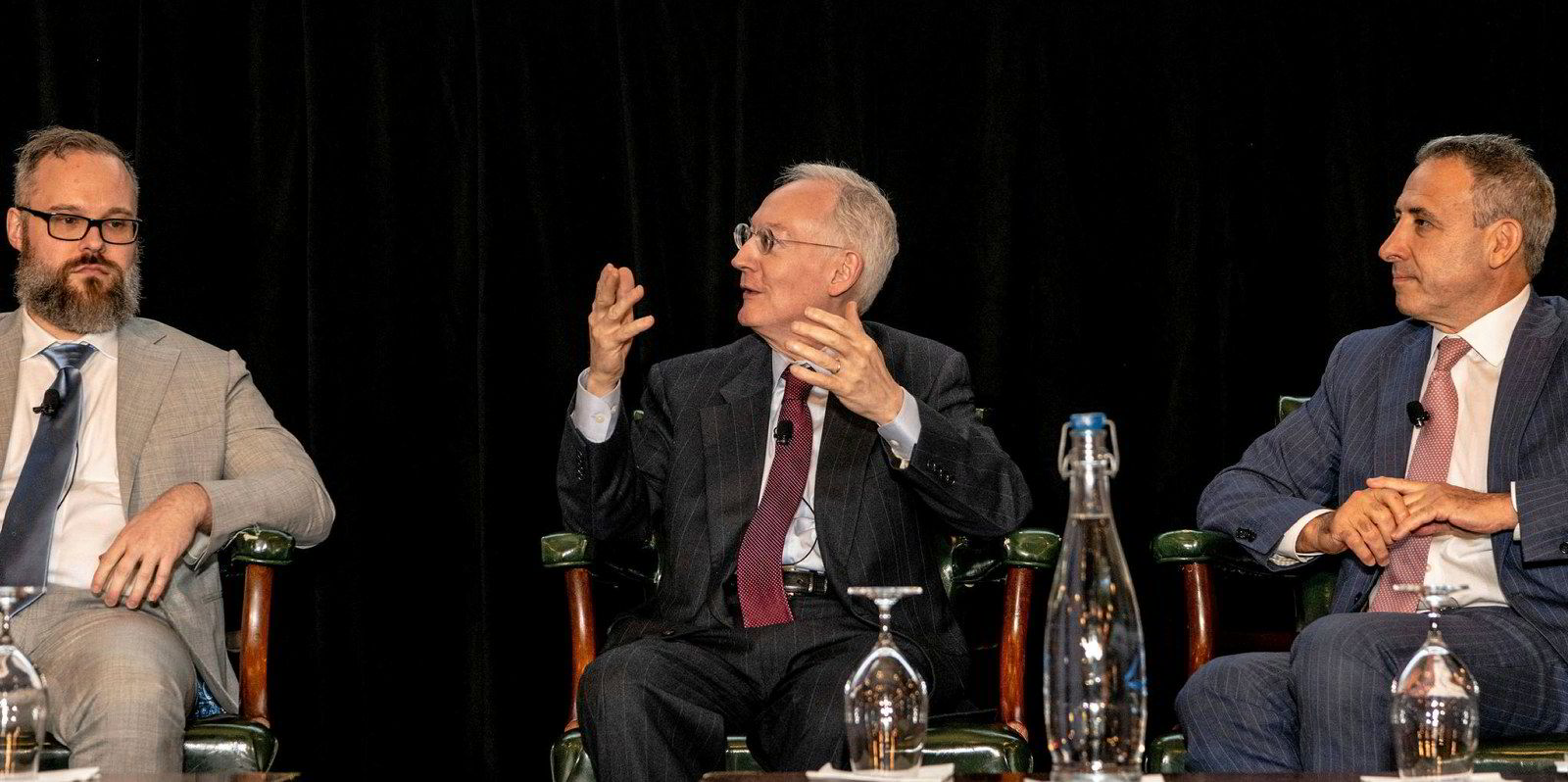Sometimes it seems there are two types of shipowners: those that are publicly listed and those that would like to be.
After all, shipping is a risky, highly cyclical business — why not navigate those treacherous cycles using “other people’s money?”
The thing is, the initial observation is far from true. According to Clarksons, there are 535 listed shipowners in the world. Of those, 55 are in the US, 39 are in Oslo, while Shanghai has more than 50, Hong Kong 42 and Tokyo 35.
There have always been many more private shipowners than public ones, and not just because the majority can’t win a listing.
Some shipowners neither want nor need to go public — indeed wouldn’t dream of it.
And there are pros and cons to both the private and public models, as Streetwise explored while moderating a recent financial panel at TradeWinds Shipowners Forum in New York.
On the panel were excellent representatives of each form.
Bob Burke has just raked in windfall profits on behalf of his Ridgebury Tankers and its investors in an 18-month selling spree of vessels acquired on the private market, helping backers double or triple their money.
Meanwhile, Hamish Norton, president of New York-listed Star Bulk Carriers, has just pulled off the company’s ninth fleet acquisition using its stock in the takeover of Connecticut’s Eagle Bulk Shipping, bringing about a bulker goliath with $2.7bn in share value.
We spoke with both — along with two top bankers and an equity analyst — about the nuances of the public-private debate. But before we get into that, let’s set the stage a bit.
Public owners are declining in their share of the world’s fleet over the past five years, according to data from Clarksons Securities.
They controlled 15,275 vessels or 15.1% of the fleet in 2019, but those numbers had eroded to 14,601 or 13.5% at the end of November 2023.
Here’s another measure. Exactly one mainstream shipowner has carried out a regular-way IPO in New York since 2019 — Israeli liner company Zim in January 2021. Indeed the drought goes back further to Gener8 Maritime’s IPO in June 2015.
But over those same five years from 2019, no fewer than eight public shipping companies have been taken private — the lion’s share of public merger activity for the period, according to one of our New York panellists, investment banker Mark Friedman of Evercore.
OK, more public owners have sprouted up in New York over that time, but they fall into one of two buckets.
There are mostly Greek owners who have done direct listings or spun off from their other public entities, many with the help of investment bank Maxim Group. But this is not because investors wanted or asked them to list, rather because principals thought they could benefit.
The second group is a wave of Oslo-listed owners who have transferred their listings. These are shipowners who have gained some scale in Norway, but are seeking New York’s deeper investor base and liquidity — perhaps also motivated by the Oslo bourse losing some lustre in their eyes.
Public vs private
So for Star Bulk’s Norton, a former investment banker, the public-company model has worked the way it’s supposed to. Star has gobbled up fleets and now a real company using its shares, furthering consolidation and creating a company of scale.
Norton told us that Star has been able to transact both with public owners, like Eagle, and private ones.
“For a public company, it’s an easy, relatively straightforward calculation: are we able to give them a currency that is more attractive than the currency they have? And in many cases, the answer is yes,” he said.
“With a private company… it’s a little bit tricky if our shares are not trading at a price that reflects their underlying value.”
Still, Star was able to do several of those deals with its stock trading above net asset value, the rest with it close to its NAV, and it’s been a win even for the private owners.
“It worked out 100% of the time. Everybody who did a deal like that with us ended up making more money than they would have made by selling their ship,” he said.

Star’s appetite for more deals remains keen, he explained, because $2.7bn in share value just isn’t enough. Large institutional investors want bigger.
“There are a shocking number of institutions that have $100bn to manage, and you want to limit that to say 200 names, then for the average share you’re in, you’d have $500m invested,” Norton said.
“And if you’re a company with a $2.7bn market cap, nobody can invest $500m — it’s not even close.”
As a private owner — and as one currently with no ships — Burke doesn’t quite have that consideration. But there are others.
“No matter how you do it, raising money is humbling. At the best,” Burke said.
“So it’s a process of asking 100 people for some funds, and most of them are half your age, and they tell you how stupid you are. And finally, someone hopefully says, ‘yes’.”
Still, Burke and Ridgebury have completed this process twice now, done well for the investors and quite likely reduced the number of clients who will tell them they are stupid.
They’re looking for more deals.
“When it’s time to go, it’s time to go,” Burke said of the recent sales.
“We have a different mission in life than my public colleagues. Our mission is to buy ships at the right price and sell them at the right price. Whereas my public colleagues’ mission is to provide a trading platform for individual investors who do that on an individual basis. And that’s a different investment mentality.”





